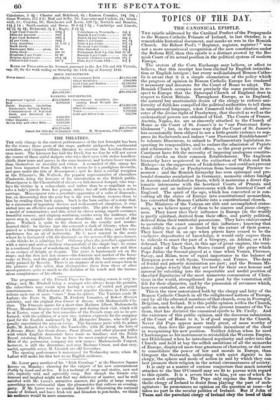THE THEATRES.
TILE only change in the current performances of the last fortnight has been for the worse: those pests of the stage, pathetic pickpockets, sentimental swindlers, and virtuous villains, threaten to overrun the London theatres once more. The Licenser has laid the Devil, but we fear he will not arrest the course of those artful dodgers who wipe their eyes with stolen handker- chiefs, draw tears and purses in the same moment, and lecture lesser rascals than themselves on morality and virtue. A scoundrel of this stamp has Just been imported from Paris, where it seems he is a prodigious favourite, and goes under the title of Monseigneur; and he finds a cordial reception at the Princess's; Mr. Wallack, the popular representative of chevaliers d'industrie, doing the honours of his introduction to the British public. Monseigneur is the Chesterfield of cheats—a full-dressed footpad, who way- lays his victims in a sedan-chair, and rather than be so ungallant as to take a lady's jewels from her person, drives her off with them in a stolen carriage. Monseigneur robs a jeweller's apprentice of a suite of diamonds; but, on discovering that the poor boy is his own brother, restores them to him by stealing them back again. Such is the bare outline of a story that, by a succession of ingenious devices and well-contrived situations, is con- verted into an effective and amusing vaudeville. The plot of the drama is a model of construction; and this, aided by clever acting, superb costumes, beautiful scenety, and claptrap sentiment, carries away the audience, who never stop to consider the outrageous absurdities and false moral of the piece. Wallack is quite in his element as the courtly and tender- hearted thief : he throws into the coxcomb a dash of felonry; when dis- guised as a brusque soldier there is a furtive look about him; and his very tenderness has au air of insincerity. He is most natural in the scene where he is fascinated with the diamonds on the person of the opera-dancer, —she thinks he is admiring leer! Oxberty plays the jeweller's apprentice with a naive and artless drollery characteristic of the simple boy: he seems in a continual dream of wonderment, from which he awakes now and then in an ecstacy of delight or despair. The piece is handsomely set on the stage; and the first and last scenes—the fountain and market of the Inno- cents at Paris, and the garden of a tavern outside the barriers—are admi- rably painted by Beverly. There is an elegance of style and composition in the pictures of this artist, that distinguishes them from those of other scene-painters, quite as much as the decision of his touch and the harmo- nious completeness of his effects.


























 Previous page
Previous page